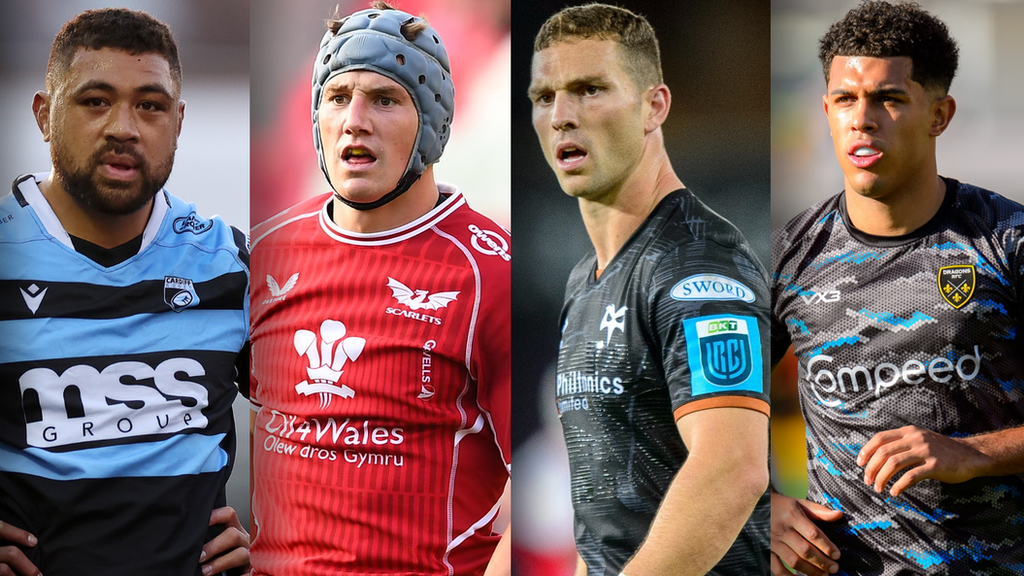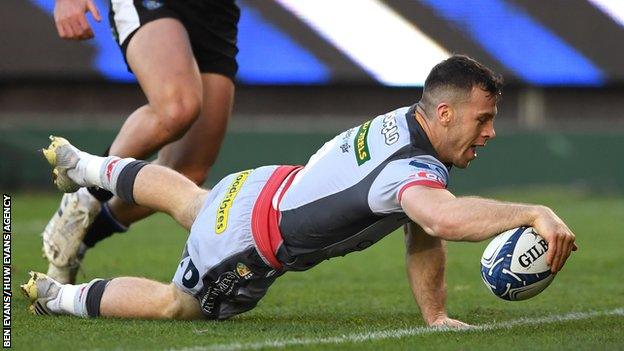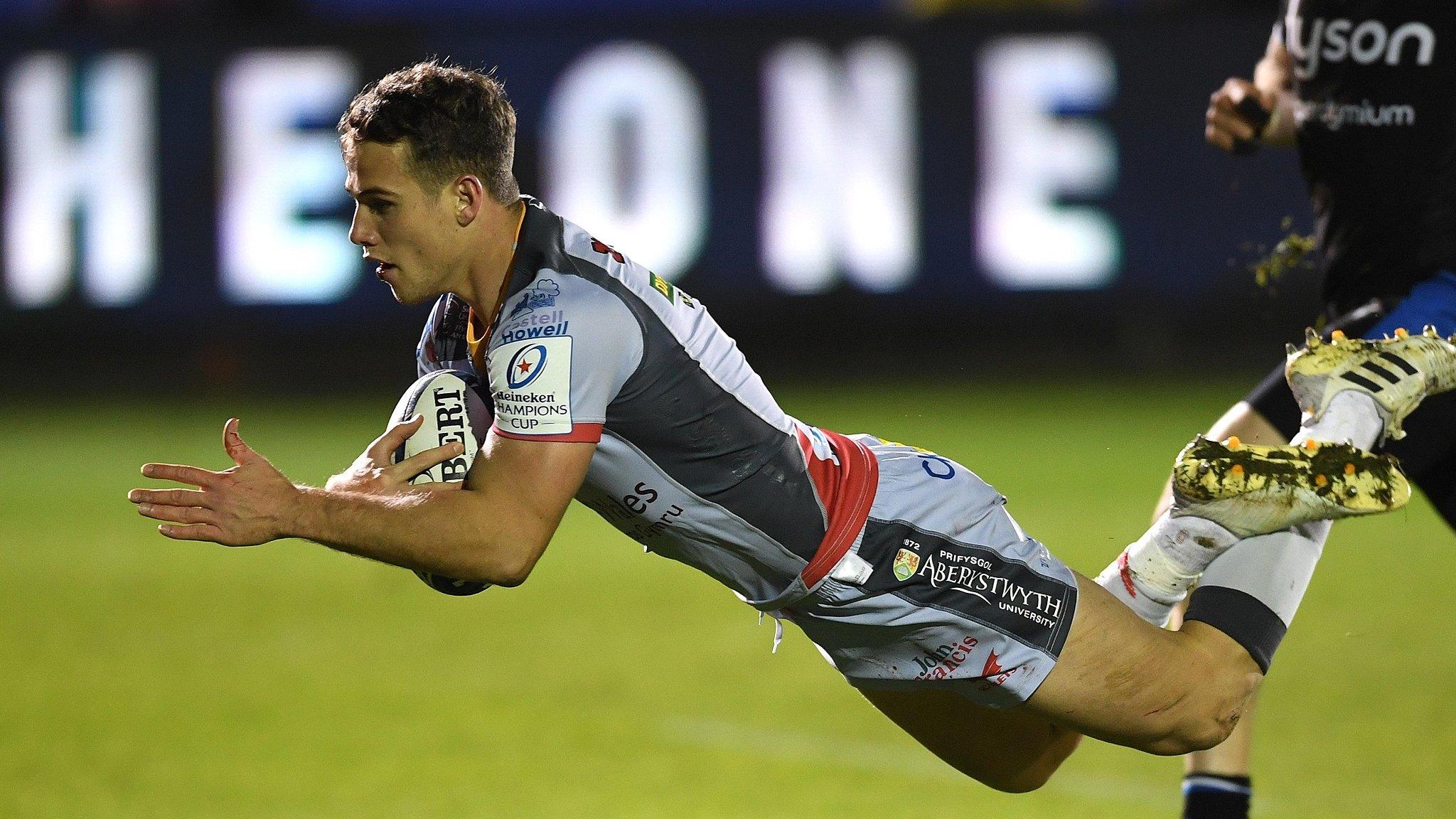Welsh rugby: What hopes for regions in Heineken Champions Cup and Challenge Cup?
- Published

Who can inspire the next Welsh success in Europe?
When Leigh Halfpenny kicked the winning points at Bath almost two years ago to the day, few at the time could have imagined the moment's full significance.
Scarlets' victory at the Recreation Ground in December 2020 remains the most recent for a Welsh region in the Heineken Champions Cup.
As losing runs go, it has become depressingly impressive.
But after a week that has seen Warren Gatland return and tepid agreement over the professional game in Wales, can the regions now offer a glimmer of hope?
There have been official Welsh 'wins' in Europe since that Scarlets success at Bath, though only following the withdrawal of their French opposition.
Even the second-tier Challenge Cup has proved, well, challenging, with Welsh regions losing their last eight games in the competition, since Ospreys beat Worcester a week after that Scarlets win.
That is a run of 20 games... 20 defeats.
Prime Ministers have come and gone, a new king has been crowned, but still the wait goes on.
And it is not getting any easier this season with the entry of five teams from South Africa stretching the concept of a 'European' competition.
Little wonder then that Ospreys, Wales' solitary qualifiers for the Champions Cup, are rated 500-1 against to reach the final in Dublin on May 20.
So what are the regions' chances this year?
Ospreys

Adam Beard is among a raft of Wales internationals available to Ospreys
To be drawn against the French champions is bad luck. To also be drawn against the English champions is almost cruel.
That is the task facing Ospreys, five years since they last tasted success in Europe's top-tier competition.
A daunting trip to Montpellier follows a home opener against Leicester Tigers who are clinging onto their head coach Steve Borthwick, who has been strongly linked with succeeding Eddie Jones in the England job.
There were times when this fixture brought European rugby to a standstill, and a full-strength Ospreys XV boasting the likes of George North, Justin Tipuric and Alun Wyn Jones can still be a match for anyone.
However questions remain over the strength of the bench and whether young fly-half Jack Walsh can carry the responsibility on his shoulders following the loss of Gareth Anscombe.
"I'm sure no one gives us a chance but that's fine, we can deal with that," said Booth.
"The new format means there's a very slim window of opportunity to qualify for the knock-out stage so it's even more important to start well, especially as we're at home."
Cardiff

Cardiff have twice previously won the European Challenge Cup in 2010 and 2018
Dai Young's side currently look the brightest Welsh hope.
They are the best performing of the regions and opponents Brive, bottom of the Top 14, and Newcastle Falcons, in a three-way tie at the foot of the Guinness Premiership, are struggling domestically.
Cardiff have some momentum through consistency in selection and have key players, such as Josh Adams and Josh Navidi, on their way back.
"Playing in Europe is always an exciting part of the year," said Young, who won the Challenge Cup with Cardiff in 2010.
"The format is a bit convoluted. I quite like the old system when it was more a concerted European block but we'll see what the fans think of it by the attendances.
"We're building momentum but we can't look far ahead because if you want to do well in Europe you have to win your home games, otherwise there's a mountain to climb."
Dragons

Dragons wing Rio Dyer is fast becoming one of the best finishers in Europe
Dragons have the potential to catch their opponents off guard, though that will depend on where Europe sits on Dai Flanagan's list of priorities.
With Christmas derbies fast approaching, Europe may be a chance to rest aching bodies, rotate the squad and blood young talent.
South African opponents Lions may regard the competition similarly, while Pau also have bigger concerns in the Top 14, where they are hovering in 12th place.
"European rugby is the pinnacle. Ideally we want to be in the Champions Cup, that's where we want to be, we won't hide from that," said Flanagan.
"This Challenge Cup brings tough teams. We know the expectation on us among the public is low, but our expectation is to perform better and better each week."
Scarlets

Gareth Davies scored against Bath - the last Welsh victory in Europe's top tier
If there is a team who need to feel the lift of a cup run, then it is Scarlets. Of all the regions, they also know just what it takes.
European rugby holds a special place in the hearts of the club - and vice versa - though this season the Challenge Cup could prove even more cathartic than ever following a terrible start.
One victory from nine has brought frustration around Parc Y Scarlets but Cheetahs, invited to compete in the tournament despite no longer being included in the United Rugby Championship, and Bayonne are both beatable - but only if Scarlets at last find their finishing touch.
Captain Ken Owens said: "Europe is ingrained in Scarlets rugby and it's great to go into a new competition with a clean slate and perhaps righting some wrongs from the season so far. We want to put a stamp on Europe and build some momentum that's desperately needed."

The format
Tournament organisers EPCR have scrapped the two-leg last-16 ties for a one-off match, though have stuck with the two-pool, external group stage that was initially brought in three seasons ago during Covid.
The classic six-pool format, with all its nail-biting 'groups of death', was abandoned during the chaos of the 2020-21 season as a temporary measure.
But having lost two weekends in October for the extra knockout stage, the switch to two pools of 12 looks set to stay.
Key Dates
Round 1: December 9-1
Round 2: December 16-18
Round 3: January 13-15
Round 4: January 2-22
Round of 16: Mar 31-Apr 2
Quarter-Finals: Apr 7-9
Semi-Finals: Apr 28-30
Finals: May 19/20

Obsessed with... SAS Rogue Heroes: Dive into the action behind the scenes of the epic drama
Match of the Day Top 10: The greatest World Cup Games ranked

Related topics
- Published24 January 2022

- Published12 December 2020
